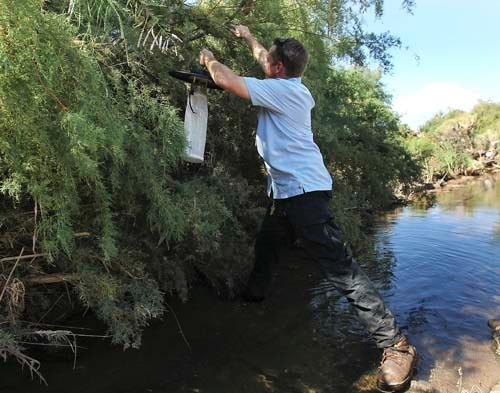Seven Clark County residents stricken with West Nile virus
Seven Clark County residents recently have been stricken with West Nile virus, the severe form that can result in paralysis from inflammation of the brain and spinal cord, the Southern Nevada Health District reported Wednesday.
Several of the victims are undergoing physical therapy at rehabilitation centers to help them regain their mobility and muscle strength, according to a health district disease investigator.
Whether they will ever fully recover from the disease largely spread by mosquitoes is unknown, the health district's Devin Barrett said.
"We really can't say," she said. "So much of that depends on their immune systems and how well the therapy works." she said.
The health district issued a statement Wednesday that said seven new severe, or neuroinvasive, cases of West Nile virus were reported last week from health care officials in the Las Vegas Valley.
Three males and four females ages 39, 57, 73, 74, 79, 81 and 83 came down with the virus.
Because of federal privacy laws, names of the patients weren't released.
All had been hospitalized. Barrett said some have gone home, but others, she doesn't know how many, remain in rehab centers.
"They've suffered nerve damage and have muscle weakness in general," she said. "They're trying to strengthen their muscles so they can function."
In mid-August, the health district reported that the first person to contract the potentially deadly West Nile virus was an 84-year-old Clark County man. He was hospitalized with the severe form of the disease but was expected to recover. Districts officials said they have received no new information about a change in his condition.
According to the U.S. Centers for Disease Control, those suffering from the severe form of the virus, about 1 in 150 cases, often experience high fever, headache, neck stiffness, stupor, disorientation, coma tremors, convulsions, muscle weakness, vision loss, numbness and paralysis.
The symptoms may last several weeks, and neurological effects may be permanent. More than 30,000 people in the U.S. have been reported with West Nile virus disease since 1999. Of those, almost 13,000 have been seriously ill, and more than 1,200 have died.
There is no specific treatment for the virus other than hospitalization, where patients receive supportive treatment including intravenous fluids, help with breathing and nursing care.
Generally, the virus is spread by the bite of an infected mosquito. Mosquitoes become infected when they feed on infected birds.
In a few cases, West Nile virus has been spread through breastfeeding, organ transplants and blood transfusions. It is not spread through casual contact such as kissing or touching a person with the virus.
No cases of the less dangerous, or the non-neuroinvasive, form of West Nile virus were reported in Clark County. Those people often are unaware they have contracted the virus, health officials say. Symptoms are much like those of the common cold, including fever, headache, nausea, diarrhea, loss of appetite and backache.
The severe cases of West Nile virus affect nervous systems and cause encephalitis, an inflammation of the brain, and meningitis, which causes inflammation to the membrane around the brain and spinal cord. Those most at risk are the very young and the very old who have underlying health issues.
In 2004, the first year Clark County reported a problem with West Nile virus, 45-year-old Joan Swanson was in a coma for 11 days after coming down with the virus. She had to go through physical therapy to walk without a leg brace.
"I'm not old, and a mosquito put me in a wheelchair," Swanson told the Review-Journal. "I suggest people take West Nile virus very seriously."
One man who takes it very seriously is Rob Cole, a health district environmental health specialist who was out Wednesday in Mesquite and Henderson setting traps for mosquitoes. As he walked up to a wash near Sunset Road and Boulder Highway, he noted this is a bad year for the virus.
"Eight cases already this year and none last year," he said. "We did the same thing to treat areas and still got hit. That's not good."
The worst year of the virus in Clark County remains the first, 2004. There were 23 cases then. The next highest number, 12, was reported in 2008.
Disease investigator Barrett said the best and easiest way to avoid West Nile virus is to prevent mosquito bites.
First and foremost, she said, people should get rid of mosquito breeding sites by emptying standing water from flower pots, bucks and barrels. Water in pet dishes and bird baths should be replaced weekly. When they're not being used, children's wading pools should be kept empty and on their sides.
Swimming pools should be regularly cleaned.
When people are outdoors, she said, people should use Environmental Protection Agency-registered insect repellent. She said to follow the directions on the package.
Because mosquitoes are most active at dusk and dawn, Barrett said that insect repellent should be used at that time and that long sleeves and pants should be worn.
"There are still people in Las Vegas who don't think we have mosquitoes in the desert," Barrett said. "Believe me, we have them."
Contact reporter Paul Harasim at pharasim@review journal.com or 702-387-2908.


















